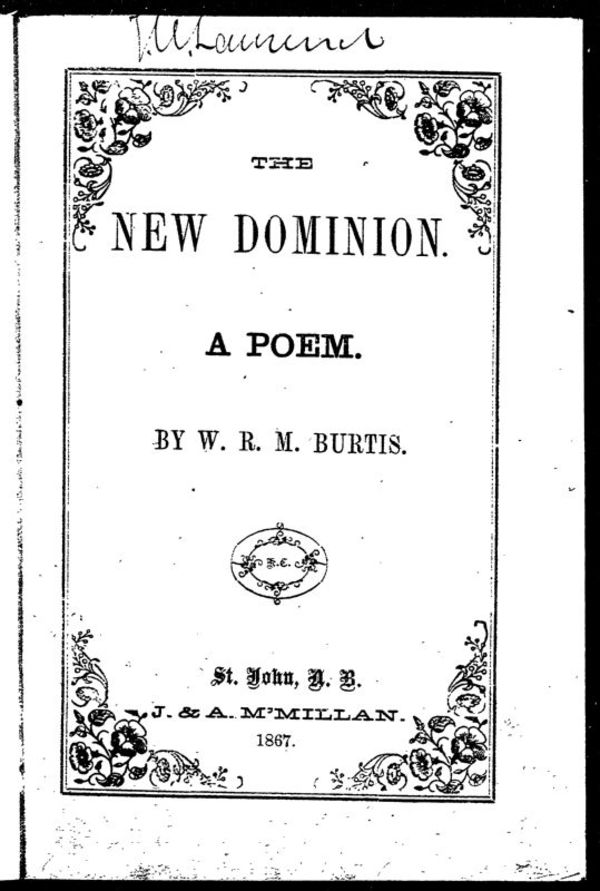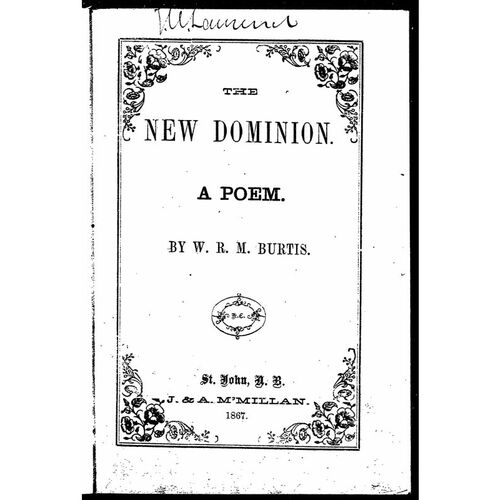
Source: Link
BURTIS, WILLIAM RICHARD MULHAREN, lawyer, author, journalist, and temperance advocate; b. 1818 in Saint John, N.B.; d. 12 Dec. 1882 in York County, N.B .
William Richard Mulharen Burtis received his early education at the Saint John Grammar School, and in 1832 began studying law in the Saint John office of William Boyd Kinnear*. Admitted to the bar as attorney in 1839 and as barrister in 1841, Burtis gradually built up a large and successful legal practice in Saint John. He was appointed common clerk of Saint John in 1855, but resigned in 1863 because of ill health, and later acted as a valuator of land damages on the Intercolonial Railway until his retirement in 1878. His major contributions, however, were made in the fields of literature, journalism, and the New Brunswick temperance movement.
In 1837 Burtis was a principal organizer of the Young Men’s Debating Society of Saint John, and in the same year he was awarded that society’s gold medal for his essay on “The rise and progress of New Brunswick.” At the society’s request, Burtis’ essay was printed in October 1837 in the sole issue of the Literary and Historical Journal (Saint John), intended by its editor, John Henry Crosskill*, to be a pioneer literary magazine in New Brunswick. Although relying heavily upon the recently published works of the early New Brunswick historians, Peter Fisher* and Robert Cooney*, Burtis’ article also reveals the zeal of the amateur historian, for he rhapsodizes on the virtues and sufferings of New Brunswick’s loyalist founders and revels in the province’s subsequent material progress. Between 1841 and 1843 he contributed several works of folklore and historical fiction concerning the early settlement of New Brunswick to Amaranth (Saint John), the first significant literary magazine in the province.
During the early years of his legal practice in Saint John, Burtis played a major role in the New Brunswick temperance movement. In 1843 he became a principal organizer of the Saint John Young Men’s Total Abstinence Society, and lectured frequently in support of the moral crusade to eradicate the evil of strong drink. When the New York-based Sons of Temperance spread into New Brunswick from Maine in 1847, Burtis became a member and in the summer of the same year was chosen patriarch of the Saint John–based Gurney Division of the organization. His major contribution to the temperance movement, however, was made as associate editor of Christopher Smiler’s Temperance Telegraph (Saint John), which commenced publication on 25 Jan. 1844 and was devoted to the cause of total abstinence. When the Telegraph became the official organ of the Sons of Temperance in New Brunswick in early 1848, Burtis became its editor and from 1850 until its demise in April 1851 he shared editorial duties with the Reverend J. D. Casewell. The weekly’s formidable influence under Burtis was indicated by the New Brunswick legislature’s decision early in 1849 to propitiate it with a special grant of £50.
Burtis resumed his literary activities in 1860, entering a competition sponsored by the Saint John Mechanics’ Institute for the best essay on “New Brunswick, as a home for emigrants.” In a field of 18, Burtis’ intensely patriotic and fervently anti-American entry was judged fifth, and, along with the four ranking above it, was published and distributed throughout the province and the United Kingdom on the orders of the New Brunswick government. Burtis’ essay, whose purpose was to attract immigrants to New Brunswick and away from the .United States, emphasized the cruel treatment the province’s loyalist founders had suffered from their American compatriots, the extreme democracy of the republican system of government in contrast to the superior British constitutional system, and the social disorders said to be characteristic of American life. Encouraged by this partial literary success, Burtis contributed several articles during 1860 to the Saint John Guardian, a short-lived literary monthly dedicated to stimulating an indigenous New Brunswick literature. Perhaps the most significant of Burtis’ contributions was “Grace Thornton, a tale of Acadia,” published in 12 chapters. In 1867, in celebration of the advent of confederation, Burtis exercised his poetic talents in The new dominion, a poem, prophesying with patriotic grandiloquence the future affluence of New Brunswick and greatness of Canada under the British constitution, in sharp contradistinction to the United States, torn by civil war. Following confederation, Burtis withdrew from literary ventures to his law practice, but his enduring enthusiasm for New Brunswick’s past found expression in the New Brunswick Historical Society, formed on 25 Nov. 1874. He became a charter member and the first secretary-treasurer of the society. Upon his retirement from the legal profession in 1878, he moved to his country residence on the north branch of the Oromocto River in York County, where he died four years later.
William R. M. Burtis’ legal career, literary endeavours, amateur historical interests, and strong temperance advocacy reflected significantly much of New Brunswick’s literary, intellectual, and social concerns and development during the mid 19th century.
W. R. M. Burtis was the author of “The rise and progress of New Brunswick . . .” published in October 1837 in the Literary and Hist. Journal of New Brunswick and Nova Scotia (Saint John, N.B.); New Brunswick, as a home for emigrants: with the best means of promoting immigration, and developing the resources of the province (Saint John, 1860); “Grace Thornton, a tale of Acadia,” published in the Guardian, a Monthly Magazine of Education and General Literature (Saint John), 1860; and The new dominion, a poem (Saint John, 1867).
N.B. Museum, W. R. M. Burtis papers; Tilley family papers. G. E. Fenety, Political notes and observations; or, a glance at the leading measures that have been introduced and discussed in the House of Assembly of New Brunswick . . . (Fredericton, 1867). Amaranth (Saint John), 1841–43. Daily Telegraph (Saint John), 14 Dec. 1882. New Brunswick Courier (Saint John), 1837–51. Temperance Telegraph (Saint John), January 1844-April 1851. Dominion annual register, 1882. Harper, Hist. directory. W. G. MacFarlane, New Brunswick bibliography: the books and writers of the province (Saint John, 1895). Morgan, Bibliotheca Canadensis. J. K. Chapman, “The mid-nineteenth century temperance movement in New Brunswick and Maine,” CHR, 35 (1954): 43–60.
Cite This Article
Murray Barkley, “BURTIS, WILLIAM RICHARD MULHAREN,” in Dictionary of Canadian Biography, vol. 11, University of Toronto/Université Laval, 2003–, accessed September 18, 2024, https://www.biographi.ca/en/bio/burtis_william_richard_mulharen_11E.html.
The citation above shows the format for footnotes and endnotes according to the Chicago manual of style (16th edition). Information to be used in other citation formats:
| Permalink: | https://www.biographi.ca/en/bio/burtis_william_richard_mulharen_11E.html |
| Author of Article: | Murray Barkley |
| Title of Article: | BURTIS, WILLIAM RICHARD MULHAREN |
| Publication Name: | Dictionary of Canadian Biography, vol. 11 |
| Publisher: | University of Toronto/Université Laval |
| Year of publication: | 1982 |
| Year of revision: | 1982 |
| Access Date: | September 18, 2024 |



